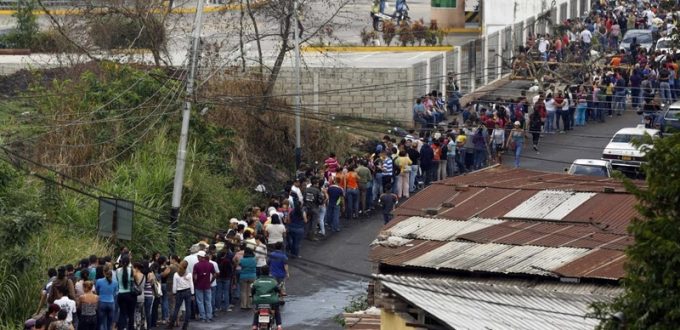
(TOP) Now, those who are having difficulty finding food in Venezuela have another problem: being able to afford it. Food costs in Venezuela have soared so high, they’re practically extraterrestrial. Those who didn’t stock up on emergency food back before the government there made it illegal are now probably fervently wishing they had.
Here’s a crash course on hyperinflation.
Hyperinflation is when prices increase to ridiculous amounts very quickly, and it usually happens when a country’s currency becomes worthless due to economic collapse or deficit spending, after the government prints more money that is backed by nothing.Hyperinflation nearly ruined Zimbabwe after the government unrestrainedly printed money to fight a war. It reached a staggering 2.2 million percent increase. The most famous case of hyperinflation occurred in the Weimar Republic of Germany in 1922-1923. In these cases, hyperinflation reached 1,000,000,000,000 to 1. (source)
Let me repeat one key point: Hyperinflation occurs due to economic collapse and when the government prints too much worthless money. Sound familiar? *cough*quantitative easing*cough*
The food costs in Venezuela have reached hyperinflation levels.
The IMF has predicted that inflation in Venezuela will reach 720% this year, while other experts set that number at 1200%. The drop in oil prices is partly to blame, as is the irresponsible spending of a socialist government.
An article in the LA Times sheds some very personal light on the situation there. A reporter interviewed a woman named Maria, a single mother who works as an accounting assistant for the government.
Her monthly pay, including a food allowance, is 27,000 bolivars.
That’s $2,700 a month at the official exchange rate of 10 bolivars to the dollar. But Venezuelans have so little faith in their currency — or the government’s ability to fix the country’s deepening economic crisis — that a dollar can fetch upward of 1,000 bolivars on the black market. At that rate, Linares earns just $27 a month.
Maria told the reporter that her family subsists on eggs, cassava, cornmeal, and powdered milk. She said they hadn’t eaten chicken since December.
She lines up overnight to get to shop in the government-regulated grocery store, but often, by the time she gets in, they are sold out. Then she has to buy her food on the black market. The last time she managed to purchase food at one government store was 3 months ago.
The price of eggs at the store is the equivalent of $45 USD. The price that Maria has to pay to the illegal street vendors is…are you sitting down? $150 per dozen. One hundred fifty dollars. For twelve eggs.
She pays about $20 per pound for cassava and $75-100 per pound for dry milk. Recently, the price of corn flour rose from 95 cents a pound to $9.50 per pound.
One source disagrees vehemently with the contents of the LA Times article.
Telesur disputes the claim that eggs cost $150, stating, “International media outlets are continuing to misreport the economic crisis in Venezuela and the effect of high inflation on the cost of living.”
But, as always, you have to consider the source. Telesur is an English-speaking news source, created to offer a “Latin-American perspective” on world events. But according to the International Business Times, the “news” you’re getting comes straight from the government party line.
The new initiative, supported by President Nicolás Maduro’s administration and touting a leftist, social-oriented message, brings the TeleSUR network into the same ranks as Al-Jazeera English, China Central Television, Russia Today and France 24 as a government-funded effort to produce English-language news from non-English-speaking countries.
Again…sound familiar? And I’m not just talking about that scene in The Interview when the dorky news guy discovers that even though it appears that there is food in the grocery stores, it’s all fake food made of plaster.
This article (In Venezuela, One Dozen Eggs Cost $150 and Dry Milk Is $100 Per Pound) by Daisy Luther originally appeared on The Organic Prepper and is licensed Creative Commons. Image credit: YouTube/Cal Molinet





milk and eggs are poison so it’s a good thing
No they aren’t…they are two of the most important foods in the world.
What you said don’t legitimate the fact that milk and eggs aren’t poison. Don’t be silly. In principle, it’s completely possible to live properly without milk and eggs.
Jotun must live on tofu and humuus